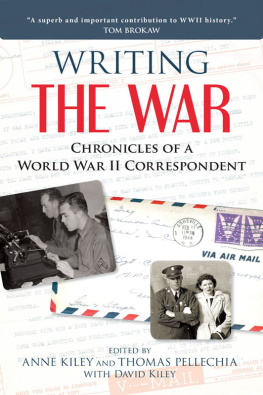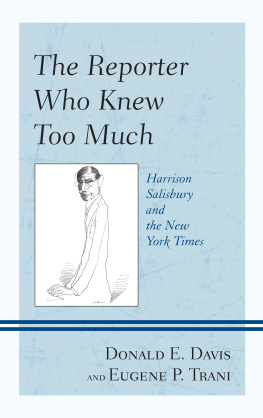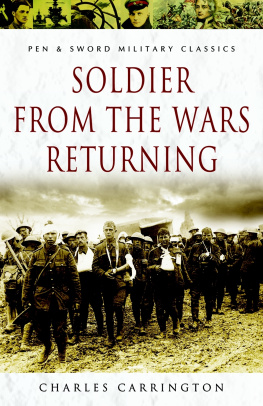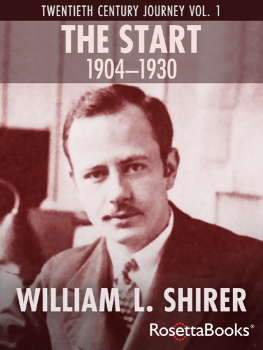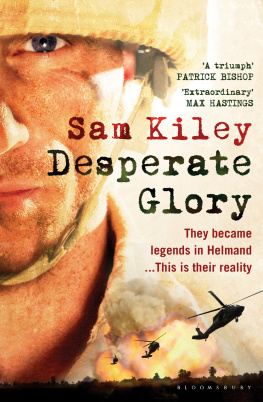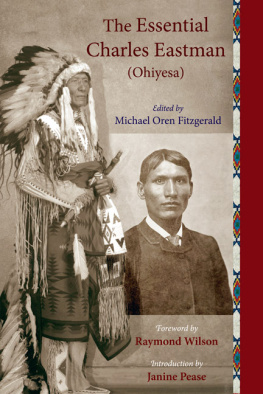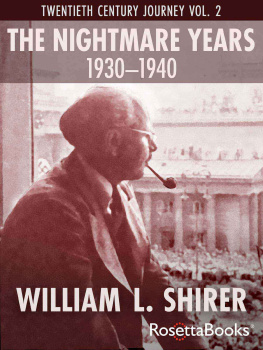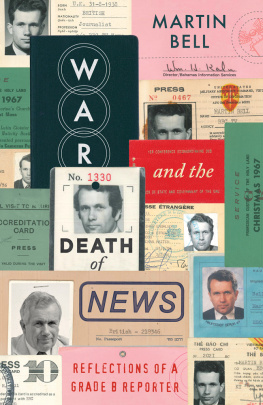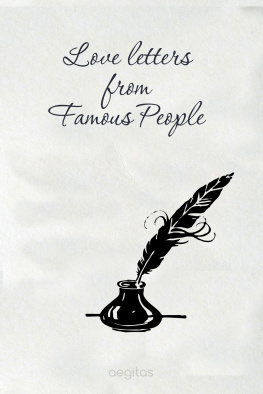
We extend our thanks to a number of people for their help and encouragement during the long process of putting this book together.
David Gardiner of the Stars and Stripes was extraordinarily helpful and generous with his time. Steven Mitchell of Prometheus Books played an essential part in the book's production. Chuck Keeton, script doctor extraordinaire, was the first to read the book's manuscript, and we are grateful for his invaluable suggestions.
Special thanks go to Jean-Yves Simon, good friend and author of The Stars and Stripes in Normandy, a scholarly study of the US Army newspaper in France during the first months after D-Day.
This book's many Facebook fans helped us immeasurably with their appreciation and comments.
We also want to thank Paul Kiley for spending much time with the wartime editions of the Stars and Stripes, picking out stories and recording them for transcription, and to John Kiley for helping with the proofreading. Special thanks and appreciation go to Joanne Buchanan, Warren Gray's daughter, for sharing her research on her father's war experiences.
We also acknowledge the World War II veterans who read and appreciated the Stars and Stripes, and who wrote millions of their own letters home.

Ardman, Harvey. Normandie, Her Life and Times. New York: Franklin Watts, 1985.
Beekman, Scott. William Dudley Pelley: A Life in Right-Wing Extremism and the Occult. New York: Syracuse University Press, 2005.
Connaughton, Richard. MacArthur and Defeat in the Philippines. New York: Overlook Press, 2001.
Copp, DeWitt S. Forged In Fire: Strategy and Decisions in the Airwar over Europe, 19401945. New York: Doubleday & Company, 1982.
Forde, Frank. The Long Watch: History of the Irish Mercantile Marine in WWII. Rev. Ed. Dublin: New Island Books, 2001.
Goldstein, Richard. Helluva Town: The Story of New York City During World War II. New York: Free Press, 2010.
Green, William. War Planes of the Second World War: Fighters, Volume Four. New York: Doubleday, 1964.
Hutton, Bud, and Andy Rooney. The Story of the Stars and Stripes. New York: Farrar and Rinehart, 1946.
Lucas, Sharon. World War II: Day by Day. Rev. ed. London: DK Adult, 2004.
Overy, Richard, ed. The New York Times Complete World War II: 19391945. New York: Black Dog & Leventhal, 2013.
Pfau, Ann. Miss Yourlovin: GIs, Gender, and Domesticity during World War II. New York: Columbia University Press, 2008.
Simon, Jean-Yves. The Stars and Stripes in Normandy. France: self published, 1980; New York: New Roads Media ebook, 2013.
The Stars and Stripes. US Army: European Editions, 19421945.

I can hear a soldier playing, You Made Me Love You, on the piano in the Recreation Hall next door. It seems appropriate because it reminds me of Asheville. Not that you did make me love youthat was as natural as the rising and setting of the sun.
[Charles to Billee, March 1942.]

The War: Following the 1941 bombing of Pearl Harbor, the Congress strengthened presidential war powers. The New York Times complained that war messages out of Washington, DC were confused, but to the men in uniformas well as their friends, parents, siblings, girlfriends, wives, and young childrenit was clear that thousands were being trained at military bases to fight war in Europe and in the Pacific.
Under the War Production Board, the manufacture of civilian consumer goods took a back seat. Women who had never worked before outside of their homes were encouraged to take defense production jobs; with gasoline and tires rationed, many rode bicycles to and from work. To save electric power, in January President Roosevelt signed the Daylight Time Act, extending daylight for one hour; it was scheduled to last only until the war's end.
On January 2, the Japanese army pushed Filipino and American forces onto Bataan and then Corregidor; soon thereafter, Libya fell to Germany's Field Marshal Rommel's Afrika Korps. With Germans in uniform blanketing the European continent, the one ray of hope to the Allies was the ill-equipped German Army bogged in the snow on the Russian front.
While the sighting of two Axis submarines in the Gulf of Mexico prompted a complete blackout along the Texas coast in late January, the first units of the newly established American Expeditionary Force arrived in Northern Ireland as the result of the US decision to build up American forces in Great Britain.

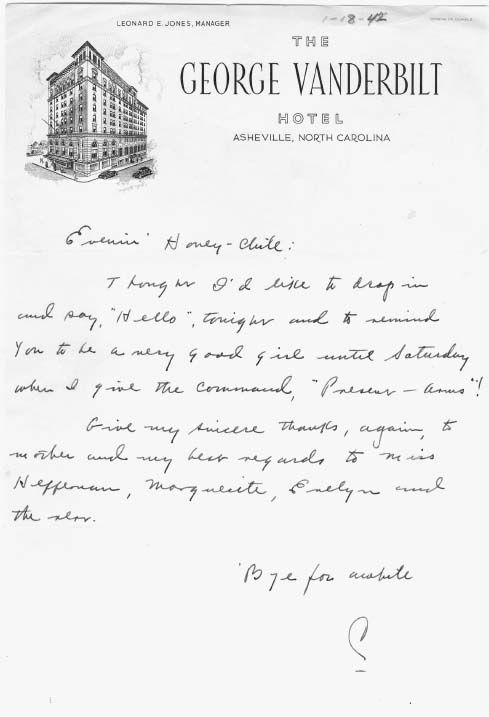
Charles's first letter to Billee. (Kiley Family)
[Charles to Billee, written in Charles's hotel room while Billee waited for him in the lobby.] January 18, 1942Asheville
Thought I'd like to drop in and say Hello, tonight and to remind you to be a very good girl until Saturday when I give the command, Present arms!
Give my sincere thanks, again, to mother and my best regards to Miss Heffernan [a long-term guest at Oak Lodge], Marguerite [Billee's friend], Evelyn [Fragge, an Asheville friend] and the rest.

[Charles to Billee] January 22, 1942Camp Croft, South Carolina
I had the inclination to drop in and see you tonight but I suppose the least that can be done under the circumstances is a little chat by mail.
You may have seen the news in the paper, or heard it on the radio, that Uncle Sam is instituting a full six-day week for the Army. I haven't heard yet whether it will affect us. However, if it does, I'll still be heading for Asheville [this] Saturday night.
I called home Monday night and gave my mother a description of the Gray hospitality. She asked me to thank your mother again, for her.
Do you know, I spent another restless night [last] Sunday. Seems like I wanted to turn back the clock to Saturday night. I wish such things were possible.

[Charles to Billee, written after their second weekend together in Asheville.] January 26, 1942Camp Croft
I was wrong, but I wish I was right; which is to say, you didn't keep me awake last night. Yes, I did sleep like a baby, just as you said, but you were the last one I thought of before the sandman dropped by. Strange, or is ityou were still in my mind when I awakened at 5:30.
As I write this, I'm listening to the radio over which a broadcast from Ireland is coming, describing the arrival of the first detachment of the AEF to Europe [Allied Expeditionary Force]. I can't help feeling a thrill to hear that at last we are doing something concrete about giving peace and serenity to our people.
But we can find nicer things to talk about, can't we?
For instance, I'm looking forward, so much, to next weekend. With a visit to the Grove Park Inn cocktail lounge, not to mention approximately 21 hours with you. I'm certain it will be a weekend I'll never forget. I believe I won't want to go to sleep, in fear of awakening to discover I've been dreaming for these weeks.
Next page
